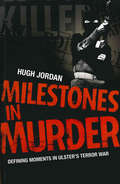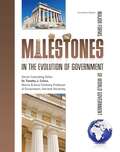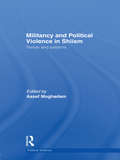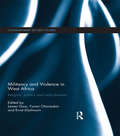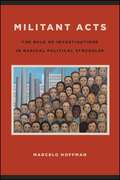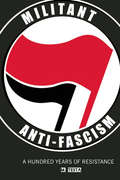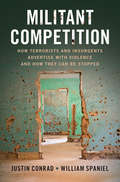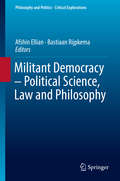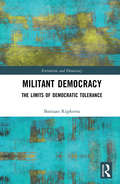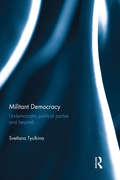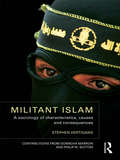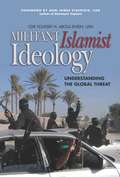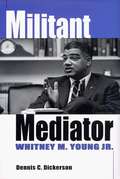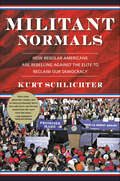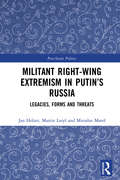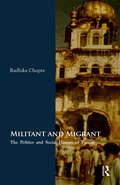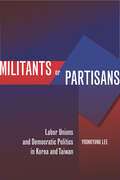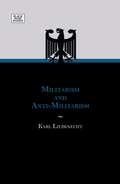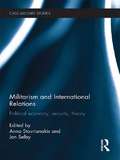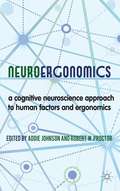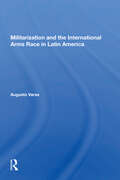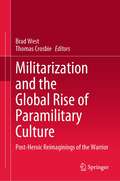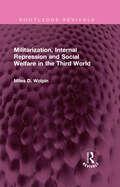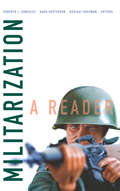- Table View
- List View
Milestones in Murder: Defining Moments in Ulster's Terror War
by Hugh JordanBeginning with the death of legendary IRA figure Sean South of Garryowen on New Year's Day 1957, the book describes the background to what we have now come to call 'the troubles' and paints vivid portraits of the major players whose actions sparked the violence that erupted on the streets of Belfast and Derry in the summer of 1969. Throughout the decades of bloodshed, paramilitary leaders on both sides of the political divide continued to search for more so-called legitimate targets. Milestones in Murder charts how more and more innocent people were unwittingly drawn into the conflict against their will. It examines the killings which marked new lows in the republican/loyalist terror war, from the bombing of pubs and clubs to the advent of 'human bomb' couriers. It revisits the horrific murders of the Shankhill Butchers, exclusively revealing exactly who leader Lennie Murphy's accomplices were. This, amongst other revelations, will piece together several parts of the Irish warfare jigsaw for the first time. The book also covers the more recent murder of the author's colleague Martin O'Hagan, an act which sent shock waves through a battle-hardened media in Northern Ireland. O'Hagan was the first journalist in Ireland to lose his life at the hands of the paramilitaries and his death pushed the parameters of slaughter to new limits.
Milestones in the Evolution of Government (Major Forms of World Government)
by Leeanne GelletlyHow did large, complex states develop from small clans and nomadic tribes? How have rulers throughout history justified their right to govern? What ideas and events shaped the development of modern forms of government? Milestones in the Evolution of Government answers these and other important questions. The book provides students with the perspective to understand the basis for various forms of government-- including their own.
Militancy and Political Violence in Shiism: Trends and Patterns (Political Violence)
by Assaf MoghadamThis book is the first systematic assessment of current trends and patterns of militancy in Shii communities in the Middle East and South Asia - specifically in Iran, Iraq, but also in Lebanon, Saudi Arabia, Pakistan, Afghanistan, Kuwait, and Bahrain More than thirty years after the Islamic Revolution in Iran, there are signs of a growing assertiveness on the part of Shii actors, at times erupting into political violence. The book addresses two key questions: What trends emerge in the types of militancy Shii actors employ both inside and outside of the Shii heartland? And what are the main drivers of militancy in the Shii community? The editor concludes that although at present Shii assertiveness does not take on a predominantly militant form, a 'subculture of violence' does exist among most Shii communities examined here, and suggests five key drivers of political violence among Shiis: the impact of Iran; nationalism and anti-imperialism; Shii self-protection and communal advancement; mahdism; and organizational dynamics. This book will be of great interest to students and researchers of terrorism studies and political violence, war and conflict studies, and IR/Security Studies in general.
Militancy and Violence in West Africa: Religion, politics and radicalisation (Contemporary Security Studies)
by James Gow Ernst Dijxhoorn Funmi OlonisakinThis volume provides a systematic and cross-regional analysis of radicalisation, militancy and violence in West Africa. Concern about terrorism in, or from, West Africa, has been recognised in academic research, and the adoption of militarised approaches to addressing it questioned. However, the basis for that questioning – the need to investigate factors such as the historical and socio-economic roots of militancy – is not developed, nor is it substantiated in existing studies. The significant impact of religiously motivated radicalisation and violence in West Africa upon international security makes it essential to understand the issues of militancy and violence in the region. In this volume, the authors draw upon empirical research in West Africa to develop understanding in these areas. Over the course of several chapters written by leading experts in the field, the book successfully blends historical and conceptual analysis with new empirical research gathered from focus group discussions and research interviews. Each of these core studies is structured around five interrelated issues: tracing the antecedents of radicalisation; monitoring trends; identifying actors; anticipating possibilities; and analysing the strength of existing preventive mechanisms. This book will be of much interest to students of African security, African politics, radicalisation, political Islam, war and conflict studies and security studies in general.
Militant Acts: The Role of Investigations in Radical Political Struggles (SUNY series in New Political Science)
by Marcelo HoffmanMilitant Acts presents a broad history of the concept and practice of investigations in radical political struggles from the nineteenth century to the present. Radicals launched investigations into the conditions and struggles of the oppressed and exploited to stimulate their political mobilization and organization. These investigations assumed a variety of methodological forms in a wide range of geographical and institutional contexts, and they also drew support from the participation of intellectuals such as Marx, Lenin, Mao, Dunayevskaya, Foucault, and Badiou. Marcelo Hoffman analyzes newspapers, pamphlets, reports, and other source materials, which reveal the diverse histories, underappreciated difficulties, and theoretical import of investigations in radical political struggles. In so doing, he challenges readers to rethink the supposed failure of these investigations and concludes that the value of investigations in radical political struggles ultimately resides in the possibility of producing a new political "we."
Militant Anti-Fascism
by M. TestaFascism is not a thing of the past and, in this era of crisis and austerity, it is growing even stronger. The fight against it must be aggressive and unrelenting. Using a mixture of orthodox history and eyewitness accounts, "M. Testa" makes the case for a resolutely militant anti-fascism, taking us from proto-fascists in nineteenth-century Austria to modern-day street-fights in London. Provocative, unapologetic, and based on extensive research.M. Testa, undercover anti-fascist blogger, has analyzed the changing fortunes of the British far right since 2009. He has written for the anarchist magazine Freedom and is a member of the Anti-Fascist Network.
Militant Competition: How Terrorists and Insurgents Advertise with Violence and How They Can Be Stopped
by William Spaniel Justin ConradMilitant groups often use violence, perversely, to gain attention and resources. In this book, the authors analyze how terrorist and rebel organizations compete with one another to secure funding and supporters. The authors develop a strategic model of competitive violence among militant groups and test the model's implications with statistical analysis and case studies. A series of model extensions allow the authors to incorporate the full range of strategic actors, focusing in particular on government efforts to counter and deter violence. The results indicate that the direct effects of competition are not as clear as they may seem, and interventions to alter competitive incentives may backfire if states are not careful. This is a timely contribution to a growing body of political economy research on militant group fragmentation, rivalry, fratricide and demonstrative violence.
Militant Democracy – Political Science, Law and Philosophy (Philosophy and Politics - Critical Explorations #7)
by Afshin Ellian Bastiaan RijpkemaThis volume offers an up-to-date overview of the much-debated issue of how a democracy may defend itself against those who want to subvert it. The justifications, effectiveness and legal implications of militant democracy are discussed by addressing questions as: How can militant democracy measures such as party bans be justified? Why is it that some democracies ban antidemocratic parties? Does militant democracy succeed in combatting right-wing extremism? And is militant democracy evolving into an internationalized legal and political concept?Bringing together experts and perspectives from political science, law and philosophy, this volume advances our understanding of the current threats to democracy, a political system once thought almost invincible. It is especially timely in the light of the rise of illiberal democracy in the EU, the increasingly authoritarian rule in Turkey, the steady shift to autocracy in Russia and the remarkable election of Trump in the US.
Militant Democracy: The Limits of Democratic Tolerance (Extremism and Democracy)
by Bastiaan RijpkemaThis book aims to present a comprehensive theory of militant democracy and to answer questions such as: How can a democracy protect itself against its own downfall? And when is intervention against antidemocrats justified? Against the backdrop of historical and current examples, this book examines a variety of theories from philosophers and legal scholars such as Karl Loewenstein, Karl Popper and Carl Schmitt as well as contemporary alternatives. It compares their interpretations of democracy and militant democracy, discusses how helpful these references are, and introduces two largely forgotten theorists to the militant democracy debate: George van den Bergh and Milan Markovitch. Militant Democracy then sets out to build a novel theory of democratic self-defence on the basis of democracy’s capacity for self-correction. In doing so, it addresses the more classic and current criticisms of the concept, while paying specific attention to the position of the judge, the legal design and effectiveness of party bans, and the national and supranational procedural safeguards that can safeguard the careful application of militant democracy instruments. Militant Democracy seamlessly combines political philosophy, political science and constitutional law to offer a new perspective on democratic self-defence. This book is essential reading for scholars and students of political theory, jurisprudence, democracy, extremism and the history of ideas.
Militant Democracy: Undemocratic Political Parties and Beyond
by Svetlana TyulkinaThe term ‘militant democracy’ was coined by Karl Loewenstein in the 1930s. He argued that attempts to establish democracy in the Weimar Republic failed due to the lack of militancy against subversive movements. The concept of militant democracy was introduced to legal scholarship and constitutional practice so as to provide democracy with legal means to defend itself against the range of possible activities of non-democratic political actors. This book offers a broad comparative look at the legal concept of militant democracy. It analyses both theoretical and substantive aspects of this concept, investigating its practice in a number of countries and on a diverse array of issues. Examining cases in Australia, Turkey, Spain, Germany, Israel, India, the USA, and the Council of Europe, Svetlana Tyulkina maps the historical development of militant democracy in constitutional theory and explores its interaction with various traditional and contemporary notions of democracy. The book analyses the possibilities and pitfalls of the concept of militant democracy when applied to protect democracy when it is under threat of harm or destruction by undemocratic actors, and suggests possible solutions and measures to overcome those dangers. In its evaluation of the capacity and justification for democracies to apply militant democracy measures, this book will be of great use and interest to students and scholars of public comparative constitutional law, international law, human rights law, and comparative politics.
Militant Islam: A sociology of characteristics, causes and consequences
by Stephen VertigansMilitant Islam provides a sociological framework for understanding the rise and character of recent Islamic militancy. It takes a systematic approach to the phenomenon and includes analysis of cases from around the world, comparisons with militancy in other religions, and their causes and consequences. The sociological concepts and theories examined in the book include those associated with social closure, social movements, nationalism, risk, fear and ‘de-civilising’. These are applied within three main themes; characteristics of militant Islam, multi-layered causes and the consequences of militancy, in particular Western reactions within the ‘war on terror’. Interrelationships between religious and secular behaviour, ‘terrorism’ and ‘counter-terrorism’, popular support and opposition are explored. Through the examination of examples from across Muslim societies and communities, the analysis challenges the popular tendency to concentrate upon ‘al-Qa’ida’ and the Middle East. This book will be of interest to students of Sociology, Political Science and International Relations, in particular those taking courses on Islam, religion, terrorism, political violence and related regional studies.
Militant Islamist Ideology
by Youssef H., Aboul-EneinA top adviser at the Joint Intelligence Task Force for Combating Terrorism argues that winning the war against Militant Islamists requires a more nuanced understanding of their ideology. His book is among the first attempts to deconstruct and marginalize al-Qaida ideology using Islamic based arguments. By clearly defining the differences between Islam, Islamist, and Military Islamist, Aboul-Enein highlights how militant Islamist ideology takes fragments of Islamic history and theology and weaves them into a narrow, pseudo-intellectual ideology to justify their violence against Muslims and non-Muslims alike. In offering a comprehensive explanation of how Militant Islamists have hijacked the Islamic religion, Aboul-Enein provides a realistic description of the militant threat, which is different and distinct from Islamist political discourse and the wider religion of Islam.
Militant Mediator: Whitney M. Young, Jr
by Dennis C. DickersonAlone among his civil rights colleagues -- Martin Luther King Jr. , Roy Wilkins, James Farmer, John Lewis, and James Forman -- Whitney M. Young Jr. advocated integrationism embraced by both blacks and whites. As a National Urban League Official in the Midwest and as a dean of social work at Atlanta University during the 1940s and 1950s, Young blended interracial mediation with direct protest. He demonstrated that these methods pursued together were the best tactics for the civil rights movement, then put them to work on a national scale upon becoming the executive director of the League in 1961. In this position, Young forcefully alerted elite whites to the urgency of the black struggle for equality and urged them to spend federal, corporate, and foundation funds to lift residents in the nation's inner cities. Although he actively interacted with powerful whites, Young also drew support from middle- and working-class blacks who shared his belief in racial integration. As he navigated this middle ground Young came under fire from both black nationalists and white conservatives.
Militant Normals: How Regular Americans Are Rebelling Against the Elite to Reclaim Our Democracy
by Kurt SchlichterMilitant Normals, written by one of the conservative movement's wittiest commentators, is a no-holds-barred takedown of the preening elites who have all but made normalcy a crime in America.Donald Trump is only the beginning of a mighty disruption in American politics and culture, thanks to the rise of the militant Normals in America.They built this country, they make it run, and when called on, they fight for it. They are the heart and soul of the United States of America, They are the Normals, the regular Americans of all races, creeds, preferences, and both sexes who just want to raise their families and live their lives in peace. And they are getting angry. . . For decades they have seen their cherished beliefs and beloved traditions under attack. They have been told they are racist, sexist, and hateful, but it was all a lie. Their ability to provide for their families has been undermined by globalization with no consideration of the effects on Americans who did not go to Harvard, and who live in that vast forgotten space between New York and Santa Monica.A smug, condescending elite spanning both established parties has gripped the throat of the nation. Convinced of their own exquisite merit while refusing to be held accountable for their myriad failures, these elitists managed to suppress the first rumblings of discontent when they arose in the form of the Tea Party. But they were stunned when the Normals did not simply scurry back to their flyover homes. Instead, the Normals came out in force and elected Donald Trump.Now, as the ruling caste throws everything it can into the fight to depose Donald Trump and reestablish unchallenged control, the Normals face a choice. They can either surrender their country and their sovereignty, or they can become even more militant. . .
Militant Publics in India
by Arafaat A. ValianiAn historically informed ethnographic study of conceptions, arenas, and practices of physical training and militancy in the context of religious nationalism intwentieth-and twenty-first-century western India. Arafaat A. Valiani offers readers a telling glimpse and a rare insider perspective of the social world in which militants are made, explaining how group physical training and technico-ethical experimentswith ithave created a powerful religious nationalist movement in the Indian state of Gujarat that has been held responsible for carrying outmassive episodes of ethnic cleansing against Indian minorities. Aclose reading of Mohandas Gandhi's writing on popular mobilization and resistance and a detailed historical investigation of hitherto understudied episodes of "satyagraha" (Gandhi's celebrated concept of non-violence), this work illuminates debates on politics in South Asian history, anthropology, and sociology. Valiani interprets his own direct observation of Hindu nationalist pogroms in contemporary Gujarat, in addition to testimonies and ethnographic observations of the inner workings of the movement discovered by the author when he immersed himselfas a "trainee" within it. "
Militant Right-Wing Extremism in Putin’s Russia: Legacies, Forms and Threats (Post-Soviet Politics)
by Miroslav Mareš Martin Laryš Jan HolzerMilitancy continues to be characteristic of many supporters of the Russian far right, encompassing a belligerent rhetoric, a strong perception of participants as political warriors and often the use of physical violence. How serious a threat does Russian militant right-wing extremism pose to Russia and the World, and how has the level of threat changed over time? This book addresses this question by exploring right-wing extremism in Russia, its historical context and its resurgence over the past thirty years. Outlining the legacies and forms presented by current right-wing extremism, with a particular focus on militant extremism, it employs a historical, descriptive method to analyse the threats and risks posed. Presented within the framework of research on extremism and political violence related to the Russian political thought, the book outlines the key criteria of identifying threats, such as the level of violence, ability to gain supporters and penetration of governing elites. Primarily aimed at researchers and academics in political science, extremism, security studies and the history of Russia and Eastern, Central and South-East Europe, this book will also be of interest to political journalists and practitioners in international security.
Militant and Migrant: The Politics and Social History of Punjab
by Radhika ChopraThis book is a study of the transformations in Punjab created by biotechnological revolutions, economic restructuring, persistent migrations, and political upheaval in the late 20th century. The sacred centre at Amritsar, the transnational settlement of Southall and a Doaba village form the terrain for this — three sites that can seen as metonymic spaces of identity that transcend geographic boundaries, and form the structure of this book. Relations between the rural, the sacred and the transnational, fostered through migration, marriage and material exchange, existed well before 1984. After 1984, however, and through the violent decades of the militancy period, these three locations became connected via the circulation of political ideologies, violent deaths, financial aid, a sense of disaffection, and the migration of men. Analysis of the linkages between transnational migration and religious revival is a key theme of this study. Conversely, the enhanced engagements of the diaspora with homeland politics became a source of support and created sanctuary spaces for political asylum seekers and transnational migrant labour. Re-analysing existing material and drawing on fieldwork-based interviews, as well as local history archives, the book presents a different framework to analyse the politics and social history of Punjab.
Militants or Partisans
by Yoonkyung LeeThe exceptional experiences of South Korea and Taiwan in combining high growth and liberal democracy in a relatively short and similar timetable have brought scholarly attention to their economic and political transformations. This new work looks specifically at the operation of workers and unions in the decades since labor-repressive authoritarian rule ended, bringing Taiwan, in particular, into the literature on comparative labor politics. South Korean labor unions are commonly described as militant and confrontational, for they often take to the streets in raucous protest. Taiwanese unions are seen as moderate and practical, primarily working through formal political processes to lobby their agendas. In exploring how and why these post-democratization states have come to breed such different types of labor politics, Yoonkyung Lee traces the roots of their differences to how unions and political parties operated under authoritarianism, and points to ways in which those legacies continue to be perpetuated. By pairing two cases with many similarities, Lee persuasively uncovers factors that explain the significant variation at play.
Militarism and Anti-Militarism
by Karl Liebknecht Dimitri RoussopolousMillions marched and protested against the military invasion of Iraq. Millions more have protested against the military occupation of Afghanistan. These antiwar sentiments publicly expressed are a reflection of a deeply rooted anti-militarism. Yet wars and militarism abound. War, according to Karl Liebknecht, "is for profit between the capitalist classes of the world powers," and the maintenance of an army ensures their retention of power. In this book, which is one of the great classics of anti-militarism, Liebknecht examines the ways in which militarism is promoted and maintained; reviews the harsh punishments meted out to soldiers, anti-militarists, and war resisters; and surveys the activities of anti-militarists, both specific tactics and the underlying philosophy. The Duluth Herald (Minnesota) predicted there "will come a time in Germany when Karl Liebknecht, pilloried and imprisoned today for daring to speak the truth, will rank higher in the list of German heroes than the Kaiser." It was an accurate prediction, says Professor Philip Foner, historian at Lincoln University in Pennsylvania, who went on to add, "unfortunately his classic book is out of print." Militarism and Anti-Militarism is now available again, important in these times. Karl Liebknecht (1871-1919) was a member of the Reichstag who was imprisoned during World War I as an anti-militarist Social Democrat. He was a founding member, with Rosa Luxemburg, of the German Communist Party (KPD) in 1918, and he led an unsuccessful revolt in Berlin in January 1919. Karl Liebknecht and Rosa Luxemburg were murdered by the German right wing immediately thereafter.
Militarism and International Relations: Political Economy, Security, Theory (Cass Military Studies)
by Jan Selby Anna StavrianakisThis book examines contemporary militarism in international politics, employing a variety of different theoretical viewpoints and international case studies. Militarism – understood as the social and international relations of the preparation for, and conduct of, organized political violence – is an abiding and defining characteristic of world politics. Yet despite the ongoing social, political and economic reach of military institutions, practices and values, the concept and subject of militarism has not received significant attention within recent debates in International Relations. This book intends to fill the gap in the current body of literature. It has two key overarching aims: to make the case for a renewed research agenda for IR centred on the concept of militarism; and to provide a series of empirically focused and theoretically informed case studies of contemporary militarism in practice. Containing a wide-ranging selection of chapters, the volume presents a diverse and eclectic body of research on militarism, designed to act as a stimulus to further research and debate. This book will be of much interest to students of military studies, war and conflict studies, international political economy and IR/security studies in general.
Militarism and the British Left, 1902–1914: 1902-1914
by Matthew JohnsonMilitarism has traditionally been regarded as a phenomenon of the political right. As this book demonstrates, however, various groups on the political left in Britain during the years before the Great War were able to accommodate, and even assimilate, militaristic ideas, sentiments, and policies to a remarkable degree.
Militarization And The International Arms Race In Latin America
by Augusto VarasMilitary conflicts and dictatorships in Latin America are the main consequences of the increasingly autonomous role of the armed forces in the region, asserts noted scholar Augusto Varas, and international factors related to the expansion of weapon industries in the North and the increasing flow of financial resources to Latin America are accelerating the arms race. Varas discusses the historical function of the armed forces in local politics, the new ideology of the "national security doctrine," and the process of conflict perception by the Latin American military. He also analyzes the inevitable relations between the arms race and the political role of the region's armed institutions. Using Chile as an example, he places these factors in context and illustrates how political crisis can escalate into a regional arms race. He then concludes with a discussion of the links between prospects for democracy in the region and demilitarization and disarmament.
Militarization and the Global Rise of Paramilitary Culture: Post-Heroic Reimaginings of the Warrior
by Brad West Thomas CrosbieThis edited book demonstrates a new multidimensional comprehension of the relationship between war, the military and civil society by exploring the global rise of paramilitary culture. Moving beyond binary understandings that inform the militarization of culture thesis and examining various national and cultural contexts, the collection outlines ways in which a process of paramilitarization is shaping the world through the promotion of new warrior archetypes. It is argued that while the paramilitary hero is associated with military themes, their character is in tension with the central principals of modern military organization, something that often challenges the state’s perceived monopoly on violence. As such paramilitization has profound implications for institutional military identity, the influence of paramilitary organizations and broadly how organised violence is popularly understood
Militarization, Internal Repression and Social Welfare in the Third World (Routledge Revivals)
by Miles D WolpinFirst published in 1986, Militarization, Internal Repression and Social Welfare in the Third World argues that there is a relationship between the level of a regime’s military spending and the degree of internal repression it inflicts. This book presents a detailed empirical analysis of this situation and presents the results of more than three dozen researchers who have published comparative or case studies of the substitution effects of military expenditures in socio-economic areas. While the primary concern is with the Third World, the book also analyses the costs to advanced capitalist and to state socialist systems and discusses their role in further militarization. This book will be of interest to students of political science, international relations, colonialism and area studies.
Militarization: A Reader (Global Insecurities)
by Roberto J. GonzálezMilitarization: A Reader offers a range of critical perspectives on the dynamics of militarization as a social, economic, political, cultural, and environmental phenomenon. It portrays militarism as the condition in which military values and frameworks come to dominate state structures and public culture both in foreign relations and in the domestic sphere. Featuring short, readable essays by anthropologists, historians, political scientists, cultural theorists, and media commentators, the Reader probes militarism's ideologies, including those that valorize warriors, armed conflict, and weaponry. Outlining contemporary militarization processes at work around the world, the Reader offers a wide-ranging examination of a phenomenon that touches the lives of billions of people. In collaboration with Catherine Besteman, Andrew Bickford, Catherine Lutz, Katherine T. McCaffrey, Austin Miller, David H. Price, David Vine
